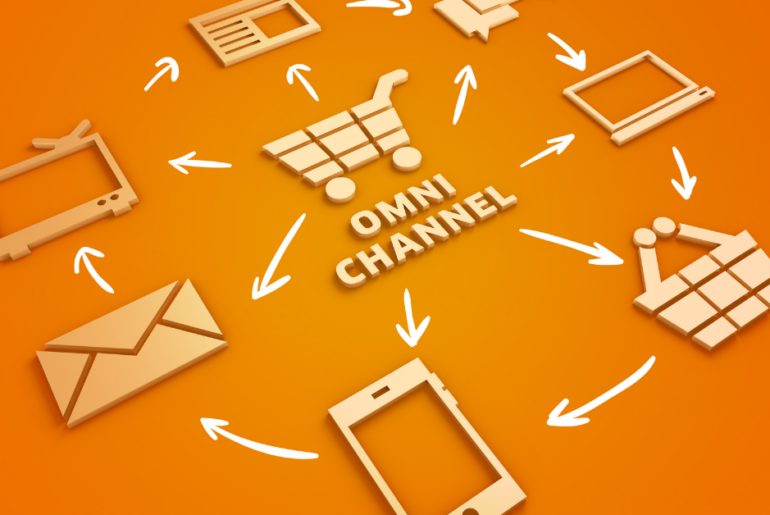Omnichannel marketing refers to creating your brand’s presence across multiple online channels like a website, app, social media, SMS, etc, with customer engagement being the primary objective.
According to MarketingTech, 75% of consumers prefer to have information about brands, products, and services through mail or mobile phones. Moreover, only one-third of people prefer to interact with customer service executives via calls.
This research has proved that companies need to focus on multiple channels to provide a seamless user experience to retain their customers. Brands must use all social media channels to provide an integrated customer experience. The best way of doing this is omnichannel marketing.
What is omnichannel marketing?
In simpler terms, embedding a brand message across multiple integrated marketing channels to work in sync with your customers is known as omnichannel marketing. A brand’s omnichannel marketing strategy provides a seamless experience to its audience, regardless of their device or the digital channel they are using.
Omnichannel marketing vs multichannel marketing
Businesses have been using TV, radio, and newspapers for advertising in the name of multichannel marketing. Omnichannel marketing is different from multichannel marketing because of its integrated approach to various marketing channels.
On the other hand, in multichannel marketing, companies use various marketing channels, but this time to target customers. Even though multi-channel marketing is also a great marketing strategy, omnichannel marketing effectively delivers brand values and messages. Omnichannel marketing does this by using a customer-focused approach.
Multichannel marketing involves the company as the starting point and the marketing channels as the finishing point. Consumers aren’t the target of the program. When it comes to omnichannel marketing, the process of marketing begins with the consumer. Brands connect all their digital channels like a chain reaction to provide a consistent message to their customers using this marketing strategy.
What sets them apart?
| S.No | Omnichannel Marketing | Multichannel marketing |
| 1 | Omnichannel includes multiple marketing channels which are connected to provide a seamless customer experience. | Multichannel marketing includes the use of multiple online and offline channels to target customers. |
| 2 | Omnichannel is a funnel-based marketing strategy. It automatically updates media and content based on the stage of the customer journey. | Multichannel marketing doesn’t use multiple media channels as a funnel. |
| 3 | This marketing strategy involved a customized approach for every customer | Multichannel marketing does not take the customer into account. |
| 4 | It increases conversion rates because of its personalized approach towards customers. | It converts less in comparison to omnichannel marketing. |
| 5 | Omnichannel marketing is better at data collection because it follows clients through various media channels. | It is not as effective in data collection as omnichannel. |
| 6 | It builds brand loyalty because it integrates all the social media, online, and offline channels and projects the same consistent brand message to the audience. | Multichannel marketing is not as consistent as omnichannel in delivering brand messages. As a result, it cannot build brand loyalty as effectively as omnichannel. |
What makes omnichannel marketing better?
-
Better customer experience
Omnichannel marketing helps brands use multiple media channels to follow a customer throughout their journey and customize the creatives and messages to suit that particular stage of the buyer’s journey. Thus, it improves the user interaction with the brand and provides a better customer experience.
-
Better conversion rates
Brands that use the omnichannel marketing approach convert better than any other form of marketing. According to a survey conducted by Clickz, omnichannel marketing has an 18.9% engagement rate in comparison to a 5.4% conversion rate by a single channel marketing strategy.
Also, the purchase frequency is 250% higher when a business uses omnichannel. In addition, the average order value increased by 13%, and the company can retain 90% more customers by using this marketing strategy.
-
Data collection
Omnichannel marketing is data-driven marketing in a simple language. Even if this is the best marketing strategy without data, it is also useless. Omnichannel requires constant data analysis to optimize campaigns as per user.
However, it gathers data better because it collects user data from multiple channels at different stages of the buyer’s journey. Also, the data collected is from various stages of the buyer’s journey. As a result, it provides real-time insights into customer behaviors.
Why does omnichannel marketing work for businesses?
Omnichannel marketing is the best marketing approach because customers converted through omnichannel marketing are more likely to purchase. Also, people who use multiple channels spend more than people who don’t.
According to the Harvard Business Review (HBR) report, omnichannel customers, who buy from online and offline stores, spend more money while shopping. These spend 4% more on in-store shopping and 10% more on online shopping.
Also, when HBR reviewed the websites of businesses, they found that omnichannel consumers spend almost 13% more on shopping. And nowadays, 73% of users are omnichannel customers. Thus, there are more chances of high-ticket sales through omnichannel marketing.
How to make an omnichannel marketing strategy?
In today’s world, creating an exceptional omnichannel strategy is not as difficult as it used to be in the days before the internet. However, to provide a seamless user experience through omnichannel, all your channels and efforts must be aligned with each other.
Also, to implement an effective omnichannel marketing strategy, the marketing team, the creative team, and the customer support team must be aligned all together and work in sync. Here are tips for creating a tremendous Omnichannel strategy.
-
Map the consumer journey
The only thing that makes omnichannel marketing more successful than any other marketing strategy is that it customizes itself according to the users. However, to provide this kind of experience, you must map various customer journeys efficiently.
It is crucial to identify all the touchpoints of the user. You must know the first media through which a customer came in contact with your campaign and what could be the final stage of a buyer’s journey.
-
Data Optimization
Omnichannel is the inevitable way to collect user data. However, if you fail to use this data to optimize your campaigns, then this may not work for you. Therefore, it is imperative to optimize your active campaigns with the data collected to convert better.





